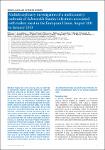Multidisciplinary investigation of a multicountry outbreak of Salmonella Stanley infections associated with turkey meat in the European Union, August 2011 to January 2013
Kinross, P.
Alphen, L. van
Urtaza, J. Martinez
Struelens, M.
Takkinen, J.
Coulombier, D.
Mäkelä, P.
Bertrand, S.
Mattheus, W.
Schmid, D.
Kanitz, E.
Rücker, V.
Krisztalovics, K.
Pászti, J.
Szögyényi, Z.
Lancz, Z.
Rabsch, Wolfgang
Pfefferkorn, B.
Hiller, P.
Mooijman, K.
Gossner, Celine
Between August 2011 and January 2013, an outbreak of Salmonella enterica serovar Stanley (S. Stanley) infections affected 10 European Union (EU) countries, with a total of 710 cases recorded. Following an urgent inquiry in the Epidemic Intelligence Information System for food- and waterborne diseases (EPIS-FWD) on 29 June 2012, an international investigation was initiated including EU and national agencies for public health, veterinary health and food safety. Two of three local outbreak investigations undertaken by affected countries in 2012 identified turkey meat as a vehicle of infection. Furthermore, routine EU monitoring of animal sources showed that over 95% (n=298) of the 311 S. Stanley isolates reported from animal sampling in 2011 originated from the turkey food production chain. In 2004–10, none had this origin. Pulsed-field gel electrophoresis (PFGE) profile analysis of outbreak isolates and historical S. Stanley human isolates revealed that the outbreak isolates had a novel PFGE profile that emerged in Europe in 2011. An indistinguishable PFGE profile was identified in 346 of 464 human, food, feed, environmental and animal isolates from 16 EU countries: 102 of 112 non-human isolates tested were from the turkey production chain. On the basis of epidemiological and microbiological evidence, turkey meat was considered the primary source of human infection, following contamination early in the animal production chain.
No license information

